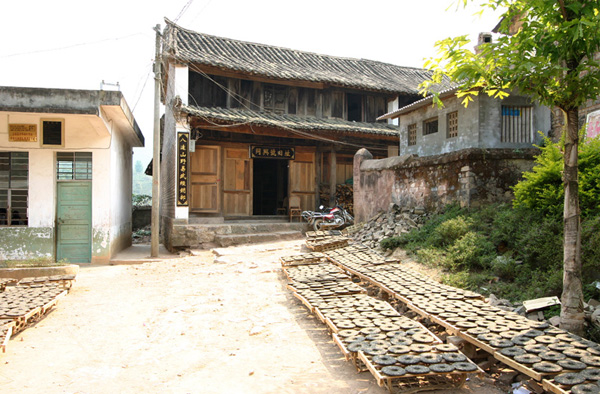
Yi Wu is in Men La Country, Xi Shuang Ban Na. It is in the east side of six ancient tea mountains, contiguous with Laos, has 750 square kilometer, the biggest among six ancient tea mountain, it also includes Yi Wu, Man Sa and Men La.
Peak time of Yi Wu Town, there were more than 100 families doing the tea business and thirty more tea houses. In Dao Guang 25th year (1845), Qing Dynasty, a stone road in the town had been repair in order to send the tributes of tea to the palace. Most of the famous tea houses, like Song Pin Hao, Tong Xin Hao, Tong Qing Hao, were founded here.
Nowadays, every spring tea harvest season, thousands of tea merchants will come to the villages in Yi Wu, such as Ma H ei, Luo Shui Dong, Gua Feng Village, Wan Gong, Cha Wan Shu, Gu Man Sha and Ding Jia Village to collect their material for the teacakes.
The sea level different in Yiwu area is quite large, every village has her own specifics thus different favour. The soil in YiWu is fertile where is foggy, misty with plenty of rainfall and sunshine. It is good for the tea tree. This typical environment makes the tea in Yi Wu become a benchmark of Puerh tea
Yi WU
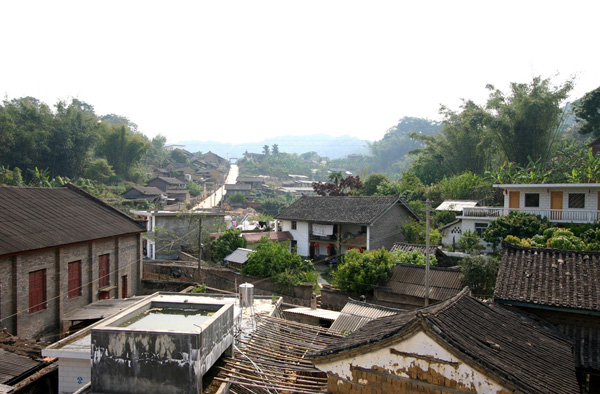
Yi Wu is in Men La Country, Xi Shuang Ban Na. It is in the east side of six ancient tea mountains, contiguous with Laos, has 750 square kilometer, the biggest among six ancient tea mountain, it also includes Yi Wu, Man Sa and Men La.
Peak time of Yi Wu Town, there were more than 100 families doing the tea business and thirty more tea houses. In Dao Guang 25th year (1845), Qing Dynasty, a stone road in the town had been repair in order to send the tributes of tea to the palace. Most of the famous tea houses, like Song Pin Hao, Tong Xin Hao, Tong Qing Hao, were founded here.
Nowadays, every spring tea harvest season, thousands of tea merchants will come to the villages in Yi Wu, such as Ma H ei, Luo Shui Dong, Gua Feng Village, Wan Gong, Cha Wan Shu, Gu Man Sha and Ding Jia Village to collect their material for the teacakes.
The sea level different in Yiwu area is quite large, every village has her own specifics thus different favour. The soil in YiWu is fertile where is foggy, misty with plenty of rainfall and sunshine. It is good for the tea tree. This typical environment makes the tea in Yi Wu become a benchmark of Puerh tea
Yi WU
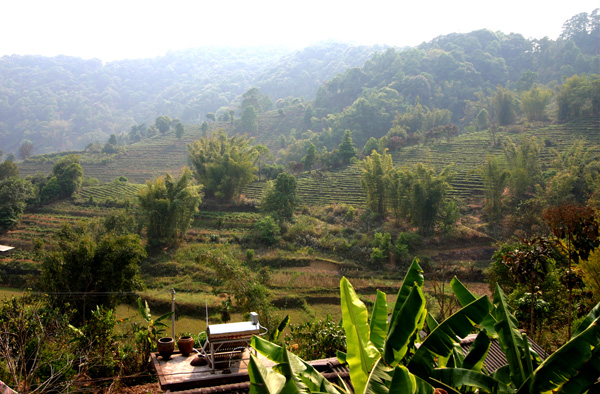
Yi Wu is in Men La Country, Xi Shuang Ban Na. It is in the east side of six ancient tea mountains, contiguous with Laos, has 750 square kilometer, the biggest among six ancient tea mountain, it also includes Yi Wu, Man Sa and Men La.
Peak time of Yi Wu Town, there were more than 100 families doing the tea business and thirty more tea houses. In Dao Guang 25th year (1845), Qing Dynasty, a stone road in the town had been repair in order to send the tributes of tea to the palace. Most of the famous tea houses, like Song Pin Hao, Tong Xin Hao, Tong Qing Hao, were founded here.
Nowadays, every spring tea harvest season, thousands of tea merchants will come to the villages in Yi Wu, such as Ma H ei, Luo Shui Dong, Gua Feng Village, Wan Gong, Cha Wan Shu, Gu Man Sha and Ding Jia Village to collect their material for the teacakes.
The sea level different in Yiwu area is quite large, every village has her own specifics thus different favour. The soil in YiWu is fertile where is foggy, misty with plenty of rainfall and sunshine. It is good for the tea tree. This typical environment makes the tea in Yi Wu become a benchmark of Puerh tea
Yi WU
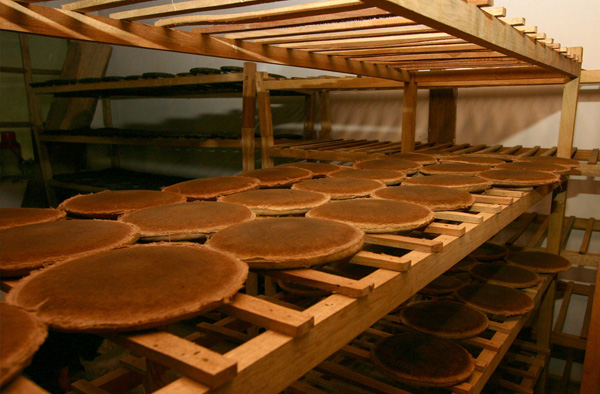
Yi Wu is in Men La Country, Xi Shuang Ban Na. It is in the east side of six ancient tea mountains, contiguous with Laos, has 750 square kilometer, the biggest among six ancient tea mountain, it also includes Yi Wu, Man Sa and Men La.
Peak time of Yi Wu Town, there were more than 100 families doing the tea business and thirty more tea houses. In Dao Guang 25th year (1845), Qing Dynasty, a stone road in the town had been repair in order to send the tributes of tea to the palace. Most of the famous tea houses, like Song Pin Hao, Tong Xin Hao, Tong Qing Hao, were founded here.
Nowadays, every spring tea harvest season, thousands of tea merchants will come to the villages in Yi Wu, such as Ma H ei, Luo Shui Dong, Gua Feng Village, Wan Gong, Cha Wan Shu, Gu Man Sha and Ding Jia Village to collect their material for the teacakes.
The sea level different in Yiwu area is quite large, every village has her own specifics thus different favour. The soil in YiWu is fertile where is foggy, misty with plenty of rainfall and sunshine. It is good for the tea tree. This typical environment makes the tea in Yi Wu become a benchmark of Puerh tea
Yi WU
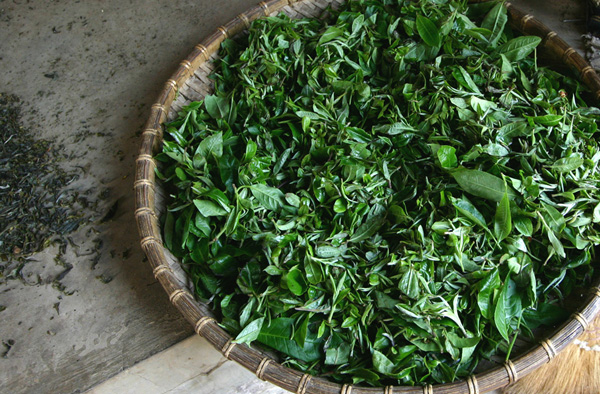
Yi Wu is in Men La Country, Xi Shuang Ban Na. It is in the east side of six ancient tea mountains, contiguous with Laos, has 750 square kilometer, the biggest among six ancient tea mountain, it also includes Yi Wu, Man Sa and Men La.
Peak time of Yi Wu Town, there were more than 100 families doing the tea business and thirty more tea houses. In Dao Guang 25th year (1845), Qing Dynasty, a stone road in the town had been repair in order to send the tributes of tea to the palace. Most of the famous tea houses, like Song Pin Hao, Tong Xin Hao, Tong Qing Hao, were founded here.
Nowadays, every spring tea harvest season, thousands of tea merchants will come to the villages in Yi Wu, such as Ma H ei, Luo Shui Dong, Gua Feng Village, Wan Gong, Cha Wan Shu, Gu Man Sha and Ding Jia Village to collect their material for the teacakes.
The sea level different in Yiwu area is quite large, every village has her own specifics thus different favour. The soil in YiWu is fertile where is foggy, misty with plenty of rainfall and sunshine. It is good for the tea tree. This typical environment makes the tea in Yi Wu become a benchmark of Puerh tea
Yi WU
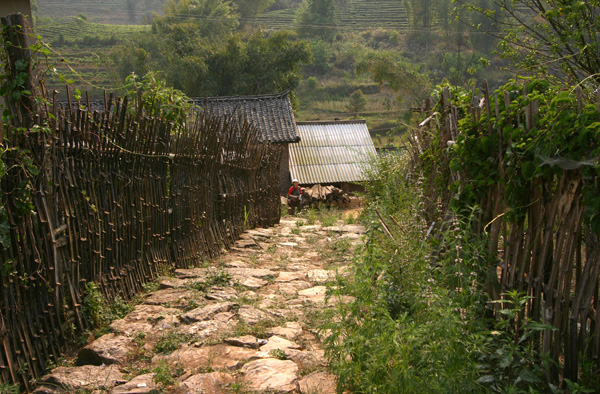
Yi Wu is in Men La Country, Xi Shuang Ban Na. It is in the east side of six ancient tea mountains, contiguous with Laos, has 750 square kilometer, the biggest among six ancient tea mountain, it also includes Yi Wu, Man Sa and Men La.
Peak time of Yi Wu Town, there were more than 100 families doing the tea business and thirty more tea houses. In Dao Guang 25th year (1845), Qing Dynasty, a stone road in the town had been repair in order to send the tributes of tea to the palace. Most of the famous tea houses, like Song Pin Hao, Tong Xin Hao, Tong Qing Hao, were founded here.
Nowadays, every spring tea harvest season, thousands of tea merchants will come to the villages in Yi Wu, such as Ma H ei, Luo Shui Dong, Gua Feng Village, Wan Gong, Cha Wan Shu, Gu Man Sha and Ding Jia Village to collect their material for the teacakes.
The sea level different in Yiwu area is quite large, every village has her own specifics thus different favour. The soil in YiWu is fertile where is foggy, misty with plenty of rainfall and sunshine. It is good for the tea tree. This typical environment makes the tea in Yi Wu become a benchmark of Puerh tea
Yi WU
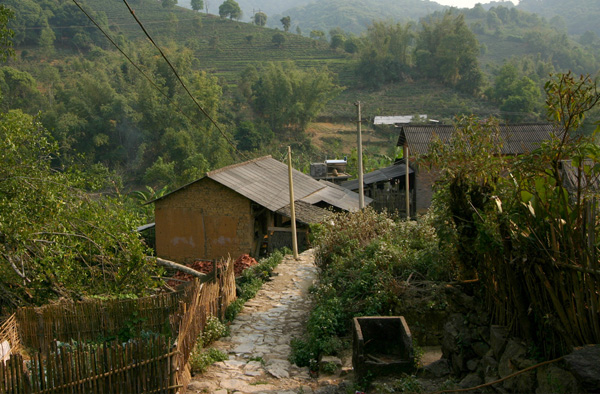
Yi Wu is in Men La Country, Xi Shuang Ban Na. It is in the east side of six ancient tea mountains, contiguous with Laos, has 750 square kilometer, the biggest among six ancient tea mountain, it also includes Yi Wu, Man Sa and Men La.
Peak time of Yi Wu Town, there were more than 100 families doing the tea business and thirty more tea houses. In Dao Guang 25th year (1845), Qing Dynasty, a stone road in the town had been repair in order to send the tributes of tea to the palace. Most of the famous tea houses, like Song Pin Hao, Tong Xin Hao, Tong Qing Hao, were founded here.
Nowadays, every spring tea harvest season, thousands of tea merchants will come to the villages in Yi Wu, such as Ma H ei, Luo Shui Dong, Gua Feng Village, Wan Gong, Cha Wan Shu, Gu Man Sha and Ding Jia Village to collect their material for the teacakes.
The sea level different in Yiwu area is quite large, every village has her own specifics thus different favour. The soil in YiWu is fertile where is foggy, misty with plenty of rainfall and sunshine. It is good for the tea tree. This typical environment makes the tea in Yi Wu become a benchmark of Puerh tea
Yi WU
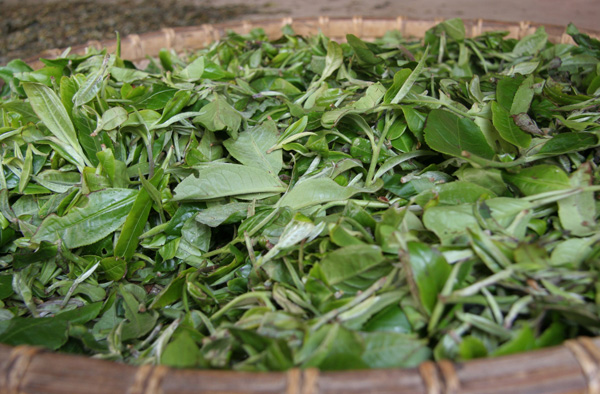
Yi Wu is in Men La Country, Xi Shuang Ban Na. It is in the east side of six ancient tea mountains, contiguous with Laos, has 750 square kilometer, the biggest among six ancient tea mountain, it also includes Yi Wu, Man Sa and Men La.
Peak time of Yi Wu Town, there were more than 100 families doing the tea business and thirty more tea houses. In Dao Guang 25th year (1845), Qing Dynasty, a stone road in the town had been repair in order to send the tributes of tea to the palace. Most of the famous tea houses, like Song Pin Hao, Tong Xin Hao, Tong Qing Hao, were founded here.
Nowadays, every spring tea harvest season, thousands of tea merchants will come to the villages in Yi Wu, such as Ma H ei, Luo Shui Dong, Gua Feng Village, Wan Gong, Cha Wan Shu, Gu Man Sha and Ding Jia Village to collect their material for the teacakes.
The sea level different in Yiwu area is quite large, every village has her own specifics thus different favour. The soil in YiWu is fertile where is foggy, misty with plenty of rainfall and sunshine. It is good for the tea tree. This typical environment makes the tea in Yi Wu become a benchmark of Puerh tea
Yi WU
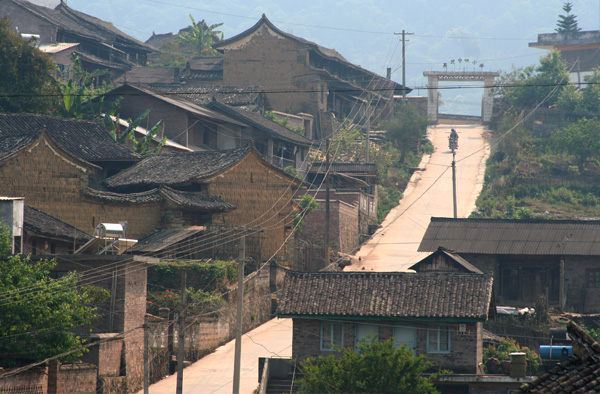
Yi Wu is in Men La Country, Xi Shuang Ban Na. It is in the east side of six ancient tea mountains, contiguous with Laos, has 750 square kilometer, the biggest among six ancient tea mountain, it also includes Yi Wu, Man Sa and Men La.
Peak time of Yi Wu Town, there were more than 100 families doing the tea business and thirty more tea houses. In Dao Guang 25th year (1845), Qing Dynasty, a stone road in the town had been repair in order to send the tributes of tea to the palace. Most of the famous tea houses, like Song Pin Hao, Tong Xin Hao, Tong Qing Hao, were founded here.
Nowadays, every spring tea harvest season, thousands of tea merchants will come to the villages in Yi Wu, such as Ma H ei, Luo Shui Dong, Gua Feng Village, Wan Gong, Cha Wan Shu, Gu Man Sha and Ding Jia Village to collect their material for the teacakes.
The sea level different in Yiwu area is quite large, every village has her own specifics thus different favour. The soil in YiWu is fertile where is foggy, misty with plenty of rainfall and sunshine. It is good for the tea tree. This typical environment makes the tea in Yi Wu become a benchmark of Puerh tea
Yi WU




















